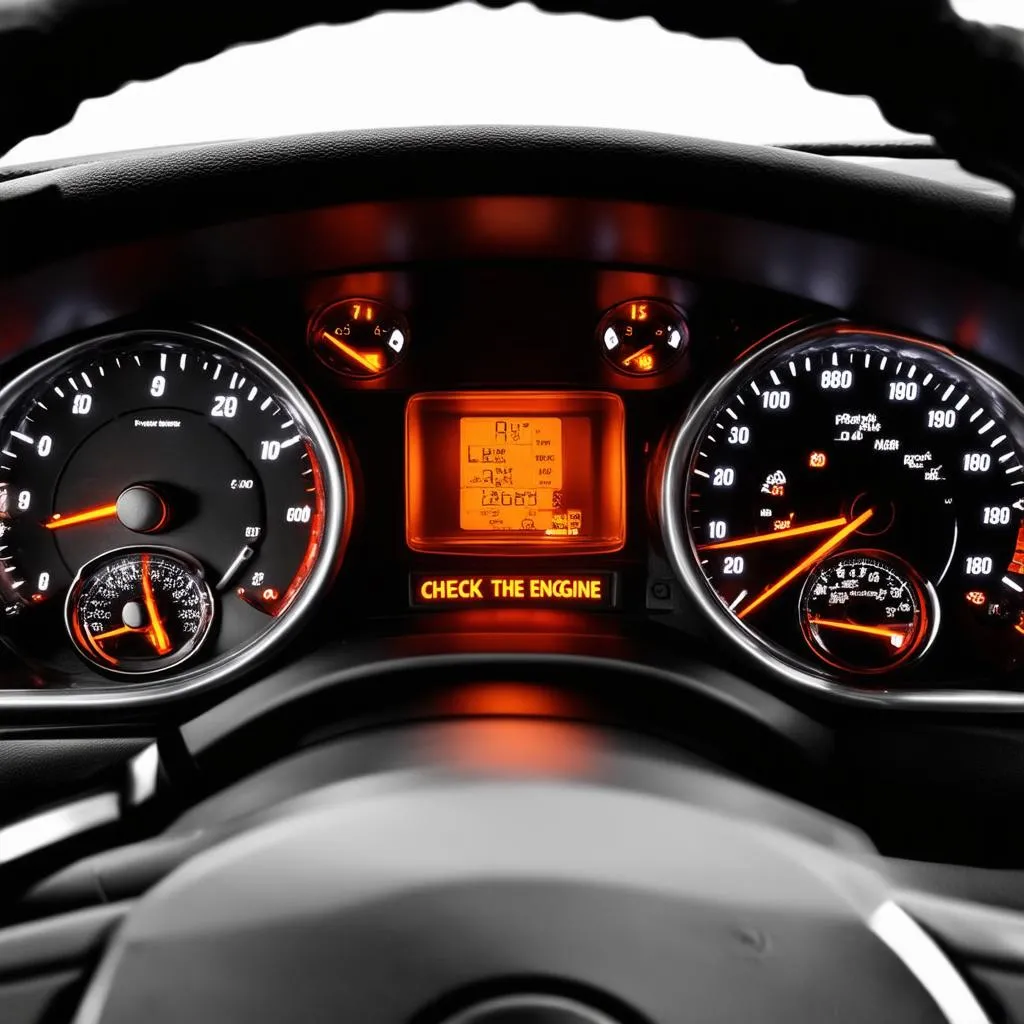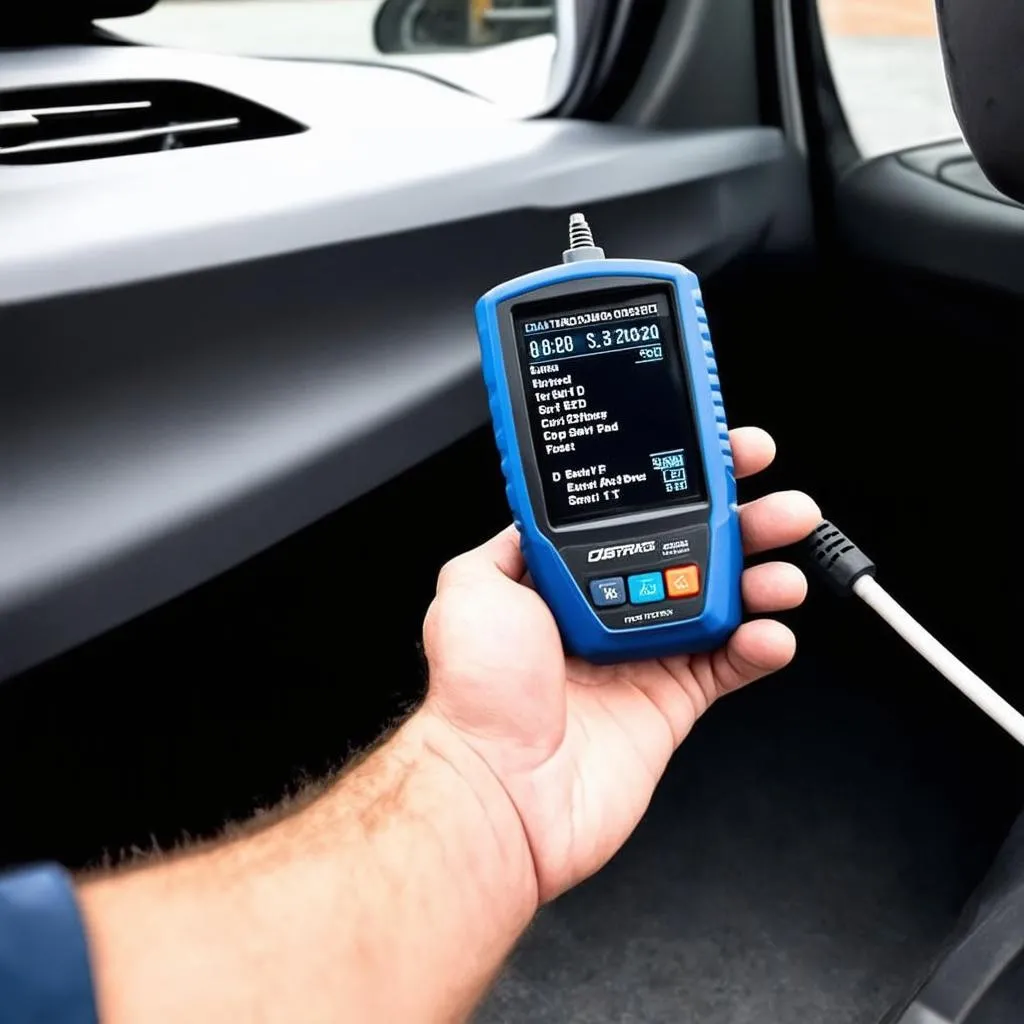Imagine this: you’re cruising down the Pacific Coast Highway, California, top down, wind in your hair, when suddenly, a little yellow light illuminates your dashboard – the dreaded check engine light. Your heart sinks. What does it mean? Is your car about to break down? Should you pull over immediately?
Relax. A check engine light doesn’t necessarily spell doom. It’s your car’s way of saying, “Hey, something might be off. Let’s get it checked out.”
Decoding the Dreaded Light: What Does a Check Engine Light Mean?
To understand the check engine light, you need to think like a mechanic, or better yet, like your car’s computer. This light is triggered by your car’s onboard diagnostic system (OBD-II), a complex network of sensors that monitor your engine’s performance.
“The check engine light is essentially a communication tool,” explains automotive expert Dr. Emily Carter, author of “The Complete Guide to Automotive Diagnostics.” “It’s how your car alerts you to potential issues ranging from minor hiccups to more serious problems.”
Why is My Check Engine Light On? Common Culprits and Their Severity
The severity of the problem can range from a loose gas cap to a failing catalytic converter. Here are some of the most common reasons why your check engine light might be on:
-
Loose Gas Cap: Believe it or not, a loose or missing gas cap is one of the most frequent culprits. It can cause fuel to evaporate, messing with your car’s emissions system.
-
Oxygen Sensor Malfunction: Your oxygen sensor measures the amount of unburned oxygen in your exhaust. If it’s faulty, your engine might burn more fuel, leading to decreased fuel efficiency.
-
Catalytic Converter Problems: The catalytic converter helps reduce harmful emissions. If it’s not working correctly, your car will fail emissions tests and potentially experience performance issues.
-
Mass Air Flow Sensor Issues: This sensor monitors the amount of air entering the engine. A faulty one can lead to poor acceleration, rough idling, and reduced fuel economy.
-
Spark Plug or Ignition Coil Problems: These components ignite the fuel in your engine. Worn-out spark plugs or a failing ignition coil can cause misfires, rough idling, and reduced power.
What to Do When the Check Engine Light Turns On
-
Don’t Panic: As mentioned earlier, a check engine light doesn’t always signal a catastrophic failure.
-
Check Your Gas Cap: Make sure it’s securely tightened.
-
Monitor Your Car’s Performance: Are there any unusual noises, smells, or performance issues?
-
Get it Diagnosed: Use a diagnostic scanner like those available for European cars at Diag XCar to read the error codes. This will give you a more precise idea of the problem. You can learn how to use these tools in our article about BlueDriver scan tools.
-
Consult a Mechanic: If the issue persists or seems serious, it’s best to consult a qualified mechanic.
 Check Engine Light
Check Engine Light
Beyond the Basics: Frequently Asked Questions About Check Engine Lights
-
Can I still drive my car with the check engine light on? It depends on the severity. A flashing check engine light usually indicates a serious issue requiring immediate attention.
-
How much does it cost to fix a check engine light issue? The cost varies widely depending on the underlying problem. A loose gas cap is a cheap fix, while a catalytic converter replacement can be expensive.
-
Can I use a code reader myself? Yes, affordable OBD-II scanners are readily available. We discuss them in our article about using PicoScope with an Autel Scanner.
-
Can ignoring a check engine light lead to further damage? Yes, delaying repairs can exacerbate the problem and potentially lead to more expensive repairs down the road.
Related Concerns: Other Warning Lights and Their Meanings
While the check engine light is a common source of anxiety, your car has other warning lights too. These include:
- ABS Light: Indicates a problem with the Anti-lock Braking System.
- Brake Warning Light: Signals an issue with the braking system, potentially low brake fluid. You can read more about brake light issues in our article on ABS and emergency brake lights.
- Airbag Warning Light: Indicates a problem with the airbag system. You can learn more about airbag codes and scan tools on our website.
 Car Diagnostic Scanner
Car Diagnostic Scanner
Don’t Let the Check Engine Light Ruin Your Drive
While the check engine light can be unsettling, understanding its meaning and taking prompt action can save you time, money, and potential headaches down the road.
Remember, early detection is key to keeping your car running smoothly.
Need help diagnosing your car troubles? Our team of auto experts is available 24/7 to assist you with any questions related to diagnostic tools and software installation. Contact us via WhatsApp at +84767531508. We’re here to help you get back on the road with confidence.